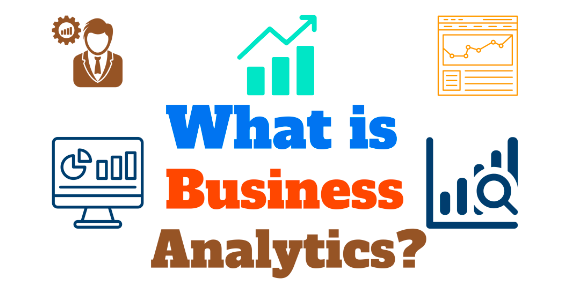Many courses have been the best to date Business Analytics courses are one of them used in the industry. The future is in your hands as We are excited to offer the “Best Business Analytics Course in Chennai”. This blog gives a complete idea of the Business Analytics overview, understanding, and prediction.
The term “business analytics” defines the tools, and techniques utilized in data analysis to develop business decisions and offer valuable data. It means looking at both past and current information for trends, patterns, and opportunities that may have an impact on performance improvements and strategic planning at all levels of the organization.
What is Business Analytics?
The process of collecting, following, studying facts, and explaining data to gain information that can be used to have extensive knowledge of business decisions is referred to as business analytics. It involves meeting valuable information from data using statistical and quantitative analytic tools and then using these insights to improve business results. Many business areas such as sales, marketing, finance, operations, and support for customers, can develop from the application of business analytics. Organizations come to educated opinions and to put in order their business procedures by considering data from many sources to find trends, patterns, and relationships.
Understanding Business Analytics
- Enhancing business performance by locating areas of the company that can be optimized is one of the main objectives of business analytics. A firm may increase client retention and increase sales.
- Organizations may find development and growth the possibility of happening with the use of business analytics.
- An organization can make strategic choices about where to allocate resources by using market data analysis to find trends and developing markets. Thinking about the future is an important component of business analytics. Organizations may plan for future trends and results by utilizing predictive analytics, which enables them to make well-informed decisions on staffing, resource allocation, and other business-related tasks.
Importance of Business Analytics
Data-driven making choices: Business analytics give firms the instruments and knowledge required to make decisions based on data. Through the utilization of data in decision-making processes, businesses can enhance their operational efficiency and successfully accomplish their objectives.
Competitive advantage: By forecasting customer behavior, recognizing market possibilities and hazards, and streamlining operations, business analytics helps firms achieve a competitive edge. This can spur growth and help companies keep one step ahead of the competition.
Enhanced performance: Organizations can enhance their operations and boost performance by evaluating data and pinpointing areas that require development. Profits can rise along with efficiency gains and cost reductions.
Improved consumer insights: By analyzing customer behavior, preferences, and trends, business analytics may help companies have a deeper understanding of their client. This might assist businesses in adapting their goods and services to match the demands of their clients and raise client satisfaction levels.
Risk management: By analyzing data and forecasting possible outcomes, business analytics can assist firms in identifying and reducing risks. This can lessen the possibility of negative results and assist companies in making better-informed decisions.
Applications of Business Analytics
Many sectors use business analytics, which is a highly helpful process. Therefore, business analytics has a wide range of applications. Here are a few notable examples of business analytics:
- Supply chain optimization
- Revenue forecasting and identifying reasons for layoffs
- Fraud detection
- Systems of recommendations
- determining the number of cabs needed in an area
- Comparison of prices at each point
Challenges of Business Analytics
Analytics in business can be hard. It’s difficult to collect reliable data and interpret complex information. However, there are still ways around these common data difficulties.
Data Complexity: It is harder to understand connectivity and ensure quality when handling data from various systems and sources. A lot of work is required to ensure context and truthfulness.
Data interpretation: Even with high-quality information, getting insightful findings requires a high level of data science and analytical skills in order to successfully examine links and patterns.
Tool Disconnection: A lot of analytics platforms and tools provide output that is often disconnected rather than integrated, making it hard to gain enterprise-wide knowledge.
Acceptance Hesitation: Despite full proof of concept, organizational alignment and the adoption of analytics addresses may be slowed down by a lack of knowledge and a data-driven culture. Thus, patience and perseverance become necessary.
Future Scope of Business Analytics
There are a lot of various sectors recruiting business analytics professionals. So, the career scope of business analytics is very large. Business analytics professionals are hired for various kinds of job roles. Their responsibilities may differ based on their designation and the sector in which their organization operates, but the end goal is the same-solving business problems.
Some Important Roles in Business Analytics
Developing Visualizations
Visualizations are essential for understanding complex data and communicating insights effectively. Tools like Matplotlib, Seaborn, Plotly, and D3.js are commonly used for creating visualizations in Python, R, and JavaScript, respectively. Learning principles of data visualization and practicing with these tools can help you create informative and visually appealing charts, graphs, and dashboards.
Building APIs (Application Programming Interfaces)
APIs allow different software systems to communicate with each other. They are crucial for building scalable and modular applications. To build APIs, you’ll need to learn about web frameworks such as Flask or Django in Python, Express.js in Node.js, or Ruby on Rails in Ruby. Understanding RESTful principles, authentication, and data serialization formats like JSON or XML is also important.
Creating and Working with Dashboards
Dashboards provide a consolidated view of key metrics and insights, often in real time. Tools like Tableau, Power BI, or Google Data Studio offer user-friendly interfaces for creating dashboards without much coding. However, if you want more customization and control, you can build dashboards using libraries like Dash (for Python), and Shiny (for R), or build custom web applications with frameworks like React.js or Vue.js.
Netsuilabs helps with the business analytics course

Netsuilabs offers training courses for 2 months. The program is meticulously designed for professionals and enthusiasts seeking to gain profound insights and practical skills in the realm of business analytics. This specialized course goes beyond foundational principles and moves into advanced concepts and cutting-edge technologies to equip participants with the proficiency needed to architect and develop intricate business analytics standards. The Participants will engage in hands-on learning experiences, ensuring they acquire the expertise in designing and implementing sophisticated business analytics.
Netsuilabs association with Zestlogic system pvt.ltd
Conclusion
Businesses can increase sales and profits, improve operations, and gain new insights from data. Analytics can provide useful information that helps any organization grow and succeed in today’s competitive market, whatever its size, be it a giant corporation or a tiny startup. Analytical methods and technologies enable the conversion of unprocessed data into useful conclusions that drive actual results.
Frequently asked questions.
1. Who can benefit from taking a business analytics course?
A business analytics course can be helpful to anyone who wants to use data to make decisions about their business. This includes professionals in areas such as finance, operations, marketing, and management and also those seeking to shift into data analysis fields.
2. What skills are required to succeed in this business analytics field?
Being able to use data analysis tools and techniques properly, think critically and solve problems in any situation, communicate effectively with others, and have an understanding of business principles and goals are all essential for success in the field of business analytics.
3. What topics are covered in this business analytics course?
- Data visualization,
- statistical analysis,
- predict future behavior,
- machine learning,
- database management and
- business intelligence tools
4. Is there a demand for professionals with skills in business analytics?
Yes, there is a great need for people with business analytics knowledge because businesses focus increasingly on data-driven clear to inform their decisions and gain a competitive advantage in the market.
5. Which is the best business analytics software?
Tableau, SAS, and Microsoft Power BI are a few of the popular choices. Qlik, IBM Cognos, Oracle Cloud, SAP Cloud, and Google Sheets are other excellent options. Excel is also useful for smaller jobs. Understanding from data becomes easy with these tools.




